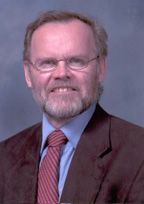 When James Booth, Ph.D., was offered a teaching assistant position upon beginning his doctoral education, he was terrified at the thought of presenting lectures in front of a classroom of students.
When James Booth, Ph.D., was offered a teaching assistant position upon beginning his doctoral education, he was terrified at the thought of presenting lectures in front of a classroom of students.
More than three decades and hundreds of lectures later, Dr. Booth is being honored with the UNMC Outstanding Teaching Award. An associate professor in the Department of Pathology and Microbiology, Dr. Booth received the award at the Annual Faculty Meeting on Monday. He also had received the award in 1986.
“I’m fortunate that our department’s past and present chairmen (currently Sam Cohen, M.D., Ph.D.) have allowed me the time to devote to teaching,” Dr. Booth said. “It’s not trivial. You need to have time to do well at teaching. Without teachers, we’re not a College of Medicine. That’s an expectation of our college from the taxpayers of the state. My department has allowed me to concentrate on teaching, and I appreciate that.”
Teaching assignments
Twenty-five years ago, Dr. Booth was recruited primarily for teaching microbiology to future physicians, physician assistants and pharmacists.
This academic year, he’ll teach 14 hours of general microbiology to medical students and 20 hours to pharmacy students; facilitate many first and second year medical student discussions; participate as a laboratory instructor for pharmacy and medical students; lead clinical pathology discussions for fourth-year medical students; provide some bioterrorism-related information to pathology residents; and explain microbiology to numerous elementary and high school students. Booth was the department leader for microbiology teaching until the College of Medicine curriculum was integrated about 10 years ago. Now, he serves as Core Director of the second-year Introduction to Disease Processes Core and the Year Two Director in the College of Medicine.
Classroom leader
Dr. Booth’s colleagues and students say that his attention to each student and his friendly style make him successful as a classroom leader.
In his nomination letter for Dr. Booth, Michael Duffy, a fourth-year medical student, said that Dr. Booth understands the “teaching dynamic” and knows how to make complicated material easily understandable for students. “He is always approachable and gladly gives his time, which is evident through many test review sessions and summer board preparation,” Duffy wrote. “He is what a UNMC professor ought to be – passionate about his work and dedicated to education.”
Individual attention
Brenda Chrastil, a third-year medical student, wrote that Dr. Booth’s attention to each student is unique. “The time and energy that he has channeled into enhancing our medical school experience has been tremendous,” Chrastil wrote in her nomination letter. “I think my entire class would agree that Dr. Booth deserves the Outstanding Teaching Award.”
Open-door policy
Dr. Booth said his students know that from day one, his office door is always open. “I’m friendly. I’m not confrontational,” Dr. Booth said. “I’d like to get to know each student on a personal basis. In my role as a core director, one group of students who I get to know well are the ones that are struggling academically in the basic sciences. These are usually bright students who understand the concepts, but find it difficult to memorize all the facts we commonly test them on.” For those students, Dr. Booth provides help with more than just their microbiology. He also discusses with them their approach to studying. He has developed some “study matrices,” which many students have used effectively. “Over the years, I’ve developed some study skills that I teach the students,” Dr. Booth said. “The students who use them generally find them quite effective.”
One of Dr. Booth’s most gratifying moments came in relation to those study skills. He said he received a card from a physician assistant student several years ago, thanking him for teaching her this alternative method of studying. “The note thanked me for helping her develop new study habits,” Dr. Booth said. “She indicated that I saved her from academic failure and that I helped to secure her chosen career. That’s very gratifying.”
Outside the classroom
Outside of his work at UNMC, Dr. Booth is a self-described “soccer dad.” His wife, Jodi, is a researcher in the department of pathology and microbiology, and they have four children. Dr. Booth also enjoys collecting Star Trek memorabilia, astronomy, reading mysteries and camping.
Nervousness is energizing
It has been more than three decades since he gave his first lecture in a laboratory full of students as a teaching assistant at the University of Nebraska-Lincoln. He said that despite his initial anxiety, he found teaching to be enjoyable. He still feels a tinge of nervousness before each classroom presentation. “I think it’s good to have that,” Dr. Booth said. “It energizes you to prepare and to give your best effort.”